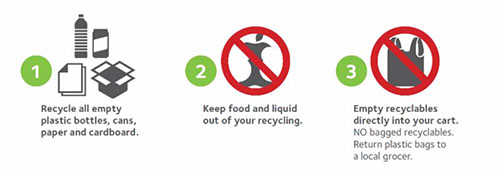On Jan. 1, Loyola implemented a zero-tolerance policy on plastic bags found in campus recycling bins. Fines of $950 will be charged to the university if a bin is found to be contaminated, sparking a campus-wide initiative to end the contamination for good.
According to Sustainability Coordinator Taylor Casalena, the university’s new recycling rule has made way for greater environmental awareness on campus.
“Loyola still struggles with contaminated recycling, but we believe this new initiative is prompting important conversations about recycling and encouraging more thoughtful recycling among faculty, staff and students,” she said.
Contamination in recycling bins can be anything from food waste to napkins.
“Just one waste item can contaminate an entire recycling bin or dumpster,” Casalena said. “Recycling that is contaminated with food, liquids or non-recyclable material is often rejected by the recycling facility and sent to the landfill for disposal.”
The presidents of the Environmental Action Club, Ellen Roussel ’18 and Eliana Marzullo ’18, agree with Loyola’s initiative and hope to use it to further their push for greater environmental awareness.
“Plastic bags are an unnecessary waste. Loyola’s culture is changing for the better when it comes to decreasing waste and the no plastic bag policy for recycling is a good step towards that,” Marzullo said. While it might seem inconvenient at first, this new policy will soon become the norm. EAC is looking forward to that more sustainable future.”
 Eleanor Knudsen ‘20 has her own club called Crochet for a Cause, which takes plastic bags and uses them to crochet bed mats for the homeless. Students can donate their unwanted plastic bags to CCSJ and help the less fortunate.
Eleanor Knudsen ‘20 has her own club called Crochet for a Cause, which takes plastic bags and uses them to crochet bed mats for the homeless. Students can donate their unwanted plastic bags to CCSJ and help the less fortunate.
The new no-bag rule has made some students more aware of the importance of smart recycling but has made less of an impact on others who followed the rule already.
“Personally, I know at home I don’t use bags in my recycling,” Hannah Herrmann ’20 said. “I feel like it might not necessarily be a new rule, it’s just that a lot of people were unaware or uneducated of the proper way to recycle.”
In an effort to educate students about smart recycling, an email was sent by Student Life in late December. According to the email, students should take their recycling outside with their Loyola-issued green recycling bin, with a paper bag, or with a reusable bag. If students still want to use plastic bags, they should first empty the recyclables into the dumpster and then discard the plastic bag in the trash.
In addition to no-bag recycling, Casalena said that Loyola’s sustainability committee has started other campaigns to strive for environmental sustainability. Some recent initiatives include the Peace Meadow, the new Arboretum walking tour, and a partnership with BGE Green Grants to convert all residential shower heads to a lower flow setting.
“The Loyola sustainability committee’s next big challenge is to tackle climate change,” Casalena said. “The committee is drafting the university’s Climate Action Plan, which will set the university on the path to reduce our carbon footprint and achieve climate neutrality.”



















































































































